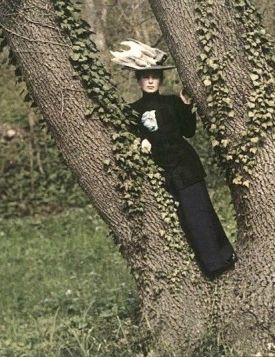Now, to make a small journey through the looking glass and down the rabbit hole...I have an odd reaction to reviews of my work. Not so much my editing work--honestly, opinion on that seems generally favorable, which makes me giggle and blush like a schoolgirl. Either that, or my critics don't care enough to be vocal.
This, fortunately for my critically oversized ego, is not the case with my fiction. You may (but probably don't) remember my reaction to a disapproving French review of "Winterblood" back in January. Unless you know me personally, or heard the WTF went 'round the world, you don't know my reaction to the reviewer who called "Winterblood" erotica--but I'm sure you can imagine it. The point is, I react to bad reviews. I over-react. I throw tantrums and call reviewers bad names and write nasty letters. I do all of this in the privacy of my own head, of course, or I'd be getting some bad reviews from law enforcement. But I still do it, and I accept the bad reviews as criticism--valid or otherwise--from experts.
And with good reviews? I...don't. I don't dissect them on this blog (though you may be certain I know and care what Midori Snyder said about "The Fawn Prince" and what Erin M. Kinch said about "Grown from Man to Dragon" and my flash fiction in general). Actually, with the two examples above, I barely even consider them reviews, just positive comments...but if they were negative comments, you can bet I would be calling them reviews, and throwing tantrums over them. So why all this attention to the bad and not to the good? Is it because I'm so insecure that I automatically consider any praise for my work to be superficial or uninformed? Or because I'm so egotistical that I take the praise for granted?
Yes, darling, I know I'm brilliant. Tell me again how much you love my style.
Hopefully I fall somewhere between the extremes, accepting compliments graciously, as neither something to take for granted nor my one source of validation. Let's face it, writers, we do think we're brilliant. If we didn't, we wouldn't dare offer our work for publication. At the same time, we do need to know--and, yes, want to know--what we're doing right. It's an erroneous assumption I frequently make when writing rejections, that writers believe they are doing everything perfectly until informed otherwise--but it simply isn't true, and that's why good reviews (and encouraging rejections) are important.
We also need to know what we're doing wrong, and maybe that's why I obsess over bad reviews, airing them everywhere and to everyone. I want to know what I'm doing wrong, and I'm hoping someone will walk up to me and say "This, this and this are what made "Winterblood" feel like erotica," because I sure don't know what did. This brings us back to the "critics as experts" thing. I feel like people who dislike my stories know something I don't, and are refusing to share it with me.
Wow, that was whiny and immature. I'm going to blame it on the cold medicine, okay?
Out of the rabbit-hole again, none of the previous has anything to do with Schneider's review of Lacuna. That told me exactly what I want to know--what works, what needs refining, and what makes people hear Lacuna and think Paradox*. Why don't you check it out, along with the other great reviews on his site?
*Funny story. Since I changed the date of my Lacuna guidelines post to reflect the day Lacuna opened to submissions (June 1)--not the day it was created (March 3)--it appears to many people that I created Lacuna in reaction to Paradox's unfortunate demise. My real reasons were not quite so fitting, so noble, or so egotistical. (Set myself up as the next Chris Cevasco? Blasphemy!) When I created Lacuna, Paradox was alive and well, and Lacuna was no more intended to compete with Paradox than Mirror Dance was with Fantasy Magazine. I expected it to be a side effort to Mirror Dance, perhaps a second chance for stories rejected by Paradox or Solander.
That's not to say I never planned for Lacuna to be as great as I could make it. Simply that I never expected, nor intended, to draw comparisons to Paradox, and I am not in any way seeking to imitate Paradox in my selection of stories or art. I am following my own judgements; if they seem to coincide with those of the late Paradox's editors, fine and dandy, but I am not trying to be Chris Cevasco. No one (least of all Mr. Schneider above) has explicity accused me of doing so, but I can't help the feeling that underneath the many comparisons I have read in blogs and cover letters(!), there is someone wondering just what I'm playing at.
Finally, and most basically, if I was trying to recreate Paradox, I would not have the brass to offer less than half their pay rate. Just saying.
Wednesday, November 25, 2009



0 comments:
Post a Comment